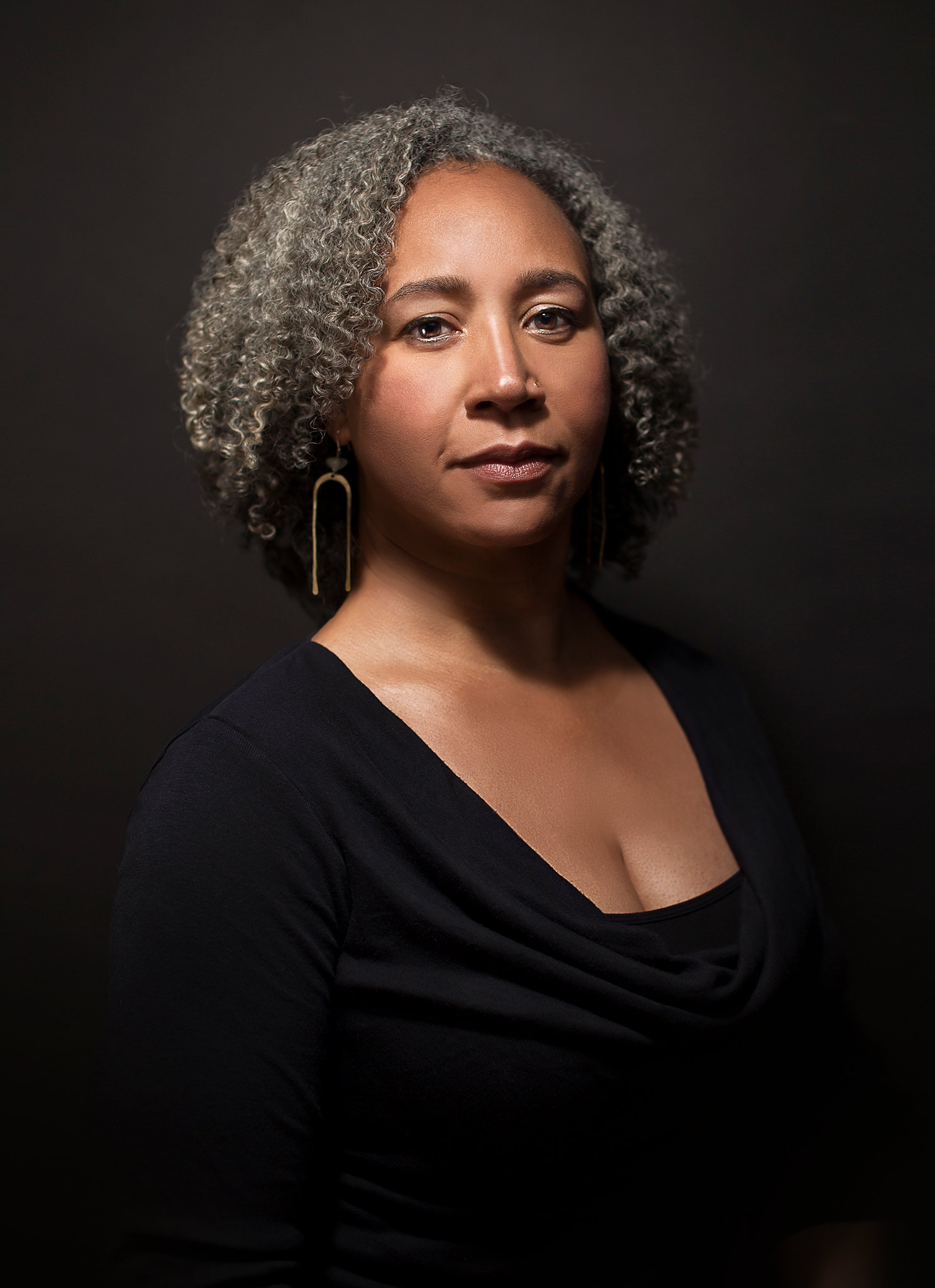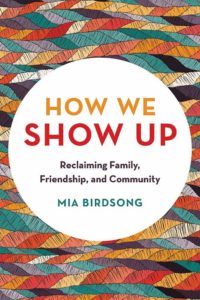
Q&A With Mia Birdsong, Author Of ‘How We Show Up: Reclaiming Family, Friendship And Community’
"We are in an abusive relationship with our country and I hope that more of us get the courage and support we need so we can choose something different."
Living through a global pandemic has left many people with an acute sense of loneliness, and has served as a stark reminder of how deeply we rely on each other — for care, for comfort, for connection. Yet, so often, we deny our inter-dependence and need for belonging.
We discussed why with pathfinder, community curator, storyteller and former Family Story Co-Director Mia Birdsong, whose book, How We Show Up: Reclaiming Family, Friendship And Community was released today. We asked her how the “American Dream” affects our relationships, who gets community-building right, and what she hopes will be different in a post Covid-19 world.
In the book you say that “people winning at the American Dream are some disconnected, unsatisfied, lonely people.” Why is that, and why do you think so many people continue to chase it?
The American Dream is a vision born of white supremacy culture (inextricably woven together with patriarchy and capitalism). There’s an illuminating piece that Tema Okun, an author and social justice activist, put together that lays out the characteristics of white supremacy culture. It includes things like urgency, defensiveness, binaries, paternalism, hoarding, more-is-better and individualism. These characteristics are inherently inhuman. Practicing them promotes the oppression and dehumanization of anyone who is devalued by white supremacy, patriarchy and capitalism.
But embodying those characteristics is also dehumanizing. To achieve the American Dream, you must adopt characteristics that crush your own sense of connection to others, that promote extraction and hierarchy, which means denying love, intimacy and care.
And to be clear, all of us in America (and other places, too) are socialized in that culture.
There are several reasons we keep chasing the American Dream. One is because it’s been marketed for hundreds of years. Part of how white supremacy maintains power is by saturating us with a fiction about how great and accessible the American Dream is, and then shaming us if we don’t achieve it.
Our most available stories are not about what is beautiful, satisfying, joyful and amazing about a truly liberatory culture — a culture in which all of us has what we need to live a life of well-being, a culture that supports our interdependence, that recognizes our inherent value, that is centered around love, care, joy and creativity.
The liberatory culture we could have doesn’t have a huge presence in America. But it’s not that it doesn’t exist, it’s that not enough of us know about it. My book is largely an effort to give more of us access to those stories.
That saturation of the American Dream narrative is also perpetuated because there’s a sense of safety — a false one — in its familiarity. In the campaign slogan “Make America Great Again” and the current emphasis on “returning to normal” is an American infomercial selling us what feels familiar. And that familiarity, even though it’s a delusion, is comforting — especially if you are white and your (unearned) power is slipping away, or you are living during a global pandemic.
What feels normal may be shitty, but that familiarity makes us feel safe. We are in an abusive relationship with our country and I hope that more of us get the courage and support we need so we can choose something different.
You’ve done a lot of research into building interpersonal networks: Who is doing it well, and what can we learn from them?
The American Dream isn’t accessible to everyone. If you are BIPOC, queer, poor, transgender, unpartnered, unhoused, a sex worker, a person with disabilities, or marginalized in any number of ways, you have less access to the standard of success and happiness as defined by the American Dream.
It’s among those groups of people that I’ve seen the most inclusive, connected, loving, nurturing, creative and expansive practices of family, friendship and community. It’s in part because we’ve had to survive systems and a dominant culture that actively oppresses us, and our most powerful resource is each other. It’s also because we are closer to our ancestral knowledge of how interdependence and connectedness work.
If we look to those models, they give us examples of what’s possible. I have some of these models as part of my own upbringing, but others are newer to me. Queerplatonic relationships are an example I discuss in the book. Learning about them, listening to people explain them and reading stories about them has allowed me to question the limitations I’ve put on my own friendships. It has also helped me to understand those relationships I have that are more intimate than what we’d typically expect from a friendship but also aren’t sexual or romantic.
I believe that somewhere inside us, we all have ancestral memory of what it’s like to live connected, interdependent lives. We may be cut off or too far away from those traditions to claim them or access them, but I think we can find our way back to them by listening deeply to our longings for belonging, for purpose and for wholeness. We can learn a way of being in the world that honors and makes tangible our connections to one another, to nature and to spirit.
Your book is being released in the midst of a global pandemic, at a time when many people are feeling an acute sense of isolation and loneliness. Do you think this experience might change how people approach family and community-building, post-pandemic? In what ways?
I certainly hope so. I’m experiencing and seeing examples of what might continue post-Covid. In my own world, which has gotten a lot smaller, I’m in deeper community with a smaller group of people. We are struggling with loneliness, especially the folks who live alone, so we’re gathering (virtually) more often.
A friend of mine started a Sunday gathering that I refer to as Mac’s Church. The two women’s groups I’ve been part of for years are gathering twice as often. One of those groups is all Black women and we are taking care of each other in ways we weren’t before. There’s intimacy being built that wasn’t there before even though we aren’t able to physically hold and comfort each other the way we want to. I think that going through this together will keep us closer post-Covid.
One of the things I’m seeing out in the world is folks starting “germ bubbles” with other households. The people I see doing this well are having really challenging conversations about guidelines and boundaries. They’re figuring out how to come to consensus about things. They’re pushing themselves toward self- examination to make agreements they can follow. They’re practicing accountability in new ways. Those groups of people are up in each other’s business in ways they weren’t before. They are developing intimacy and interdependence that they didn’t have before. I imagine that a lot of those groupings will continue post-Covid as forms of extended family.
It’s too soon for me to understand this well, but I suspect that some of what’s galvanizing people, especially white people and non-Black people of color, to protest the murders of Tony McDade, Breonna Taylor, George Floyd and Ahmaud Arbery are that Covid has made it more clear to them that our existing systems were designed to harm anyone who is not wealthy, white and straight. Covid has also increased folks’ awareness of our interdependence and our reliance on workers who are primarily Black and brown. I wonder if knowing that systems are oppressing the people we most depend on has probably inspired more people toward action.
Unfortunately, a lot of the mutuality and connection we’re seeing born of this crisis may not stick around after it. As I mentioned, there’s a lot of comfort in returning to the familiar. If we lose the spaciousness that so many of us have found in this moment, it will be really hard to maintain the communities and connections that have been built. Those connections require tending, so we have to have time and space to tend to them if we want to keep them.
In the introduction, you talk about your own path toward creating the community you want and a life that most aligns with your values, and how writing this book was part of that exploration. Is there anything that stands out to you that you learned, or that was really solidified, during the process of writing this book?
Throughout my research I was confronted with our discomfort with asking for help. The toxic individualism of the American Dream has us believing that needing help is a weakness. But what I saw modeled among so many of the people I interviewed was a rejection of that idea.
I often return to something Amoretta Morris, the Director of National Community Strategies at the Annie E. Casey Foundation, wrote several years ago, “It’s OK to ask for help. In fact, by doing so, you are taking part in the divine circle of giving and receiving. While we often focus on what the request means for the asker/recipient, we should remember that giving can be transformative for the helper…By not asking for help when you need it, you are blocking that flow.”
We are not meant to do it — to get by, to make progress, to celebrate, to grieve — alone. So, I’m trying to ask for help more often and accept offers of help more often — not just when I really need something, but when it would bring more ease to my life.
And because I know how hard it is to ask for help, I’m doing more intentional offering. I’m trying not to say things like, let me know if you need anything. But instead I make specific offers based on what I know is going on for folks, especially if they are in crisis, grieving or just having a particularly hard or painful time.
When sheltering-in-place started, I reached out to some of my friends who have health conditions that make them high-risk and helped make plans for their safety, brought them meals, and offered anything I thought would make their lives less stressful. In the last week I’ve had white and non-Black POC friends practice this in ways I’ve never experienced before, like offering to buy my family meals and leaving gifts on my porch. It has definitely made a difference in my emotional well-being.
Asking for and providing support is another way we build intimacy. It allows us to know each other more deeply. It allows us to be seen by each other. That intimacy strengthens the connective tissue of our relationships, and that’s powerful protection during a time when our government systems are either incapable of protecting us or actively working to harm us.
Mia Birdsong is an activist, writer and facilitator. She is a Senior Fellow of the Economic Security Project. You can follow her on Twitter and Instagram.
